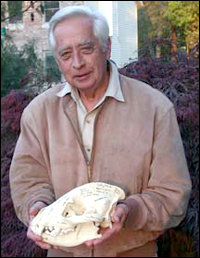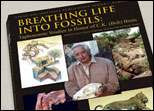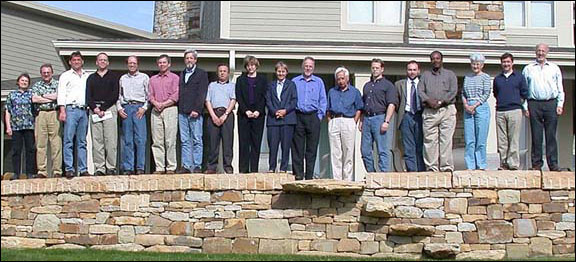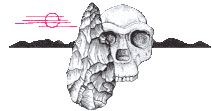From April 28th through May 1st, 2004, scientists from around the world convened in Bloomington, Indiana to celebrate the life and career of Bob Brain, Curator Emeritus of the Transvaal Museum in Pretoria, South Africa. Dr. Brain is an African prehistorian with over 50 years of experience in the natural sciences. He is best known for his research at famous ape-man cave sites in southern Africa.
This book is the result of the Stone Age Institute conference celebrating the life and career of naturalist Bob Brain, a pioneer in bringing taphonomic perspectives to human evolutionary studies.
African Taphonomy: A Tribute to the Career of C.K. "Bob" Brain was sponsored by the Wenner-Gren Foundation for Anthropological Research, the Stone Age Institute, and Indiana University (Offices of the Chancellor, the College of Arts and Sciences, the Vice President for Research, and International Programs).
Public Lecture |
Closed Session |
Public Symposium |
Leighton A. Wilkie Memorial Lecture on Human Origins |
African Taphonomy: A Tribute to
the Career of C.K. ‘Bob’ Brain |
Missing Links: Early Archaeology and Human Origins |
| Wednesday, April 28th, 2004, 4:30 pm |
Stone Age Institute, Bloomington, IN
April 29 – April 30, 2004 |
Saturday, May 1, 2004, 10 am–4:30 pm
IU Bloomington |
| Frangipani Room, Indiana Memorial Union, IU Bloomington |
Conference Co-Organizers
Travis Pickering, Kathy Schick and Nicholas Toth |
Travis Pickering
The Career and Life of Bob Brain:
Example, Inspiration, and Continued Work
at Swarkrans Cave |
| Lecture by paleoanthropologist, C.K. (Bob) Brain, Curator Emeritus of the Transvaal Museum (Pretoria, South Africa) |
The participants were scientists who study fossils and the processes of fossilization in Africa, try to understand their implications regarding hominid behavior, adaptation, and paleoenvironments.
The participants included: |
Bob Brain
Hunters or Hunted? Raymond Dart’s
Contribution to Paleoanthropology |
| "Driving Forces Behind the Evolution of Human Technology" |
C. K. Brain (Transvaal Museum, Northern Flagship Institution, South Africa)
Fifty years of fun with fossils: some cave taphonomy-related ideas and concepts that emerged between 1953 and 2003 |
Francis Thackeray
Hominids in the Sterkfontein Valley, South Africa |
| |
Anna K. Beherensmeyer
(Smithsonian Institution, USA)
Changes over three decades in skeletal part survival
and bone modification in the Amboseli ecosystem, southern Kenya |
Ron Clarke
The 4-Million-Year-Old Sterkfontein Cave Australopithecus Skeleton |
| |
Robert J. Blumenschine, Salvatore D. Capaldo, Jackson K. Njau, Briana L. Pobiner
(Rutgers University, USA)
Peter Andrews (Natural History Musuem, UK)
Charles R. Peters (University of Georgia, USA)
New contributions from vertebrate taphonomy to the understanding of Oldowan hominid landscapes and land use at Olduvai Gorge. |
Kathleen Kuman
Excursions into the early archaeology
of southern Africa |
| |
Henry T. Bunn (University of Wisconsin, USA)
Carcass transport and bone assemblage formation by Hadza foragers at Lake Eyasi, Tanzania |
Gary Haynes
Elephants in the Forest with a Desert Heart |
| |
Ron J. Clarke
(University of the Witwatersrand, South Africa)
Travis Rayne Pickering (Indiana University, USA)
On the taphonomy of three Australopithecus skeletons from Sterkfontein |
Kay Behrensmeyer
The Bones of Amboseli Park, Kenya:
Studying the Present to Understand the Past |
| |
Naomi Cleghorn (State University of New York at Stony Brook, USA)
Curtis W. Marean (Arizona State University, USA)
The destruction of human-discarded bone by carnivores: The growth of a general model for bone survival and destruction inzooarchaeological assemblages |
Robert Blumenschine
Recent Investigations at Olduvai Gorge, Tanzania |
| |
Manuel Domínguez-Rodrigo
(Universidad Complutense, Spain),
Travis Rayne Pickering, Charles P. Egeland (Indiana University, USA)
Models of passive scavenging by early hominids: Problems arising from the equifinality in carnivore tooth mark frequencies and the extended concept of archaeological palimpsests |
Henry Bunn
The Role of Meat in the Foraging of early Homo |
| |
Gary Haynes (University of Nevada, USA)
Rather odd detective stories |
Manuel Dominguez-Rodrigo
A New Research Project on Human Evolution
at Lake Eyasi, Tanzania” |
| |
Gail Krovitz, Pat Shipman
(Pennsylvania State University, USA)
Taphonomy of immature hominid skulls and the Herto, Mojokerto, and Taung specimens |
Curtis Marean
The Evolution of Behavioral Modernity:
New Evidence for an African Origin |
| |
Kathleen Kuman, Joel C. Le Baron
(University of the Witwatersrand, South Africa)
Site context in the South African Acheulean |
Martha Tappen
New Discoveries from Dmanisi,
Republic of Georgia |
| |
Travis Rayne Pickering, Charles P. Egeland
(Indiana University, USA)
Manuel Domínguez-Rodrigo
(Universidad Complutense, Spain)
C.K. Brain (Transvaal Museum, Northern Flagship Institution, South Africa)
Carcass foraging by early hominids at SwartkransCave (South Africa): A new investigation of the zooarchaeology and taphonomy of Member 3 |
Nicholas Toth and Kathy Schick
The Dawn of Human Technology:
Do it Like an Ape-Man |
| |
Rick Potts (Smithsonian Institution, USA)
Spatial scales of analysis of African mid-Pleistocene hominin activity and faunal change |
Tim White
Tracking Technology through the
Middle Awash, Ethiopia |
| |
Kathy Schick, Nicholas Toth, Travis Rayne Pickering, Thomas Gehling, Jason Heaton
(Indiana University, USA)
Excavation and taphonomic analysis of a recent striped hyena den in northeastern Jordan |
Questions from the public, followed by a reception |
| |
Martha Tappen (University of Minnesota, USA)
Neotaphonomy of Parc National des Virunga (The Congo) as a model for background frequencies of carnivore damage to bone |
|
| |
Francis Thackeray (Transvaal Museum, Northern Flagship Institution, South Africa)
Hominids and carnivores at Kromdraai A and B |
|
| |
Alan Walker (Pennsylvania State University, USA)
The taphonomy of the Rusinga Island Lagerstätte |
|
| |
Tim D. White
(University of California, Berkeley, USA)
Modified vertebrate fossils from Herto, Ethiopia |
|




